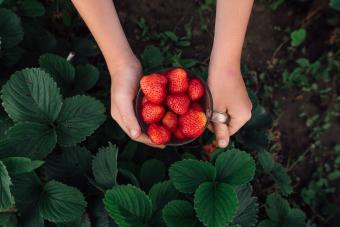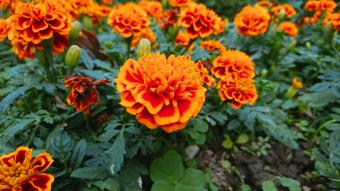
Basil

Dill

Eggplant

Tomato

Spinach

Strawberry

Marigold

Asters

Petunias

Every Asparagus Needs a Companion

© 2025 LoveToKnow Media. All rights reserved.
Asparagus grows slowly and steadily, but with the right companion plantings, you can help it along.
Megan's contributed both writing and research to a myriad of associations including academic publications, cultural institutions, non-fiction works, and experimental collaborative projects.
Read MoreLearn about our Editorial Policy.

If you like the torture of slow payoffs like international shipping and snail mail, then you'll love planting asparagus. But, to make sure your garden's full of useful bugs, beautiful flowers, and delicious ingredients in the three-year interim before they start sprouting, check out these perfect asparagus companion plants.

Basil is the poster child herb for pasta and pizza and is a great companion plant to your slow-growing asparagus. On top of having a delicious aroma, basil attracts the beneficial pollinators every garden needs to thrive. Think bees and butterflies. At the same time, it's one of the few plants that naturally deters asparagus beetles, which'll feed on your sprouts and turn them brown.

Like basil is integral to many Italian dishes, dill is for delicious Greek food like the famed tzatziki sauce. And just like basil, dill works wonders when planted by your asparagus. All you have to do is to cultivate a few dill plants, and you'll have a natural aphid, spider mite, and squash bug repellant. So, while you're waiting for your asparagus to grow, you can whip up a few delicious meals using your homegrown dill.

When you think of asparagus and complementary fruits or veggies, eggplant isn't something that comes to mind. Yet, eggplant is a great companion vegetable to plant near asparagus because it doesn't compete for nutrients in the asparagus's soil, and the asparagus wards off root-knot nematodes that are detrimental to eggplant's root systems. In this way, they've got a great give-and-take kind of relationship.

In addition to eggplants, you can also grow tomatoes right beside your asparagus. Watch both grow big and tall thanks to their symbiotic relationship. The tomato and eggplant chemical, solanine, which naturally deters asparagus beetles, will keep your asparagus safe while the asparagus's chemicals keep root-knot nematodes away from your tomatoes.

Interestingly, greens like spinach are nice companions to asparagus. Like eggplants, they don't compete for nutrients or space, and they're safe to plant right alongside asparagus. If you love a super-organized garden, then keeping all your green vegetables in one plot will make your heart happy. Replanting fresh spinach in the summer will also keep your asparagus cool thanks to its tall leaves.

Strawberries are delicious perennial fruits that can flourish when planted around asparagus. These berries grow low to the ground and can help overtake any space that weeds would've used to wriggle their way into your asparagus plot. This cuts down on how much weeding you have to do while your asparagus is taking its sweet time to grow.

If you've got a weak olfactory sense, then marigolds are a bright and beautiful plant to place near your asparagus plot. For some, their pungent smell is a bit too strong to handle, but if you're trying to get your asparagus to make it the three years it takes to start producing, you'll need every companion plant you can get.
Because of their smell and a chemical called limonene that they secrete, dangerous bugs like aphids and whiteflies will stay far away from your asparagus. It's just a bonus that marigolds' cheery colors can brighten any day spent toiling in your garden.

Aster plants look like spiky daisies and come in a multitude of species, each with their own unique color scheme. Because they also like a lot of sunlight and well-drained soil, they do great when planted with asparagus. Similarly, asters aren't friendly to most insects, including dangerous asparagus beetles and wasps. Keep your asparagus plots safe and pretty with a few aster plants.

Petunias are pretty, petite flowers that offer many of the same benefits to asparagus as asters and marigolds. They repel nasty bugs like asparagus beetles, but they don't keep good pollinators like bees away. Because of this, you can plant them right alongside your baby asparagus and fill the (three-year-long) empty space with something colorful.

Asparagus take quite the time to grow its big beautiful stalks. If you're planting asparagus for the first time, you want to give it a fighting chance of making it to that three or four-year mark. The best way to help them? Planting beneficial companion plants, like these.